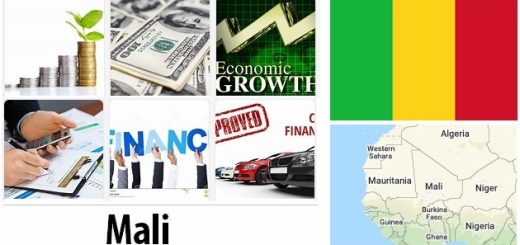Tanzania Economy Facts
Economical overview
Tanzania is dependent on extensive external assistance and loans to manage its finances. Income from mining, tourism and financial services increased during the 2010s, but high population growth means that money is not enough to remove the Tanzanians from poverty. Most people survive on small-scale farming for housing needs.
The mining industry, tourism and agricultural exports are all industries that are sensitive to fluctuations in the business cycle in the world markets. When there are worse times in the world, income to the Treasury decreases rapidly. Therefore, Tanzania’s donors want the country to broaden its economy. Significant deposits of natural gas were found during the 2010s, which are expected to provide Tanzania with new much-needed income (see Natural Resources, Energy and the Environment).
- Countryaah.com: Major imports by Tanzania, covering a full list of top products imported by the country and trade value for each product category.
In the mining industry, gold mining and export are, above all, an important source of income. In the 2010s, however, the tourism industry referred to gold exports as the country’s most important source of foreign currency. Other growing industries are telecommunications and banking, as more and more Tanzanians receive mobile phones, the Internet and bank accounts. All in all, the service sector now accounts for a larger share of the country’s GDP than agriculture.
Market economy is introduced
During the 1960s and 1970s, Tanzania invested heavily in basic care and education. At the same time, production and economic policy were neglected. As a result, both agricultural and industrial exports fell, and in the mid-1980s the Tanzanian economy was in acute crisis.
- Abbreviationfinder.org: Check this abbreviation website to find three letter ISO codes for all countries in the world, including TZA which represents the country of Tanzania. Check findjobdescriptions to learn more about Tanzania.
In 1985, a rescue program was started in collaboration with the IMF, which lent money in exchange for the devaluation of the Tanzanian currency, shilling, and the removal of government subsidies on basic commodities. The state budget deficit was pushed down.
During the 1990s, the state-controlled economy was liberalized by abolishing price controls, deregulating the banking system, and loss-weighted state-owned companies starting to sell out. However, it proved difficult to privatize the state monopoly companies in, for example, electricity, telecommunications and railways.
For the vast majority of people, the transition to a market economy became a difficult time. The abandoned subsidies made food and fuel more expensive. New fees for health care and schooling led to fewer children in school and poorer public health.
Low tax revenue, a lot of aid
A turnaround could be discerned after the turn of the millennium. The economic reforms led farmers now to sell their own goods in local markets, and the supply of goods has increased. Most Tanzanians have got a little more money to move around.
At the same time, the informal sector of the economy has grown, which means that tax collection is low. The government is now investing in trying to increase tax revenues in order to reduce the continuing large deficits in the state budget.
Tanzania is heavily dependent on aid. Sweden provides assistance for democracy development, economic growth and poverty reduction and supports the OAG’s work against corruption. The dependency on aid makes Tanzania vulnerable when donor countries withhold payments due to corruption in the state administration or lack of democracy. The Government is therefore striving to reduce the share of aid in the budget.
The biggest obstacle to economic development is probably the corruption that permeates society. Comprehensive bureaucracy and poor communication are also major challenges. The Magufuli government (2015-2020) invested a great deal in developing and improving the infrastructure, including roads, airports, railways and hydropower plants.
Trade deficit and high external debt
Tanzania has long had a large deficit in foreign trade. This means that imports have far exceeded exports. In order to pay imports, the country has been forced to rely on external aid and loans. At the end of the 2010s, the trade deficit fell sharply as Tanzania began using more domestic natural gas to generate electricity instead of imported oil.
In the middle of the first decade of the 2000s, Tanzania had a large portion of its foreign debt written off. They fell from 59 percent of GDP in 2005 to 29 per cent of GDP in 2006. Since then, however, foreign debt has again shot up rapidly.
Gold is the most important export product, followed by precious stones, pearls, other metals, tobacco, coffee and cotton. Tanzania also exports cashews, tea, spices and sisal (a kind of hemp). On the import side, fuel, vehicles, industrial goods, machinery and building materials dominate.
READ TIP – read more about Tanzania in UI’s web magazine Foreign
magazine : Money in hand can help poor people break vicious circle (2019-02-06)
FACTS – FINANCE
GDP per person
US $ 1,051 (2018)
Total GDP
US $ 57,437 million (2018)
GDP growth
5.2 percent (2018)
Agriculture’s share of GDP
28.7 percent (2017)
Manufacturing industry’s share of GDP
7.7 percent (2017)
The service sector’s share of GDP
37.9 percent (2017)
Inflation
3.6 percent (2019)
Government debt’s share of GDP
37.3 percent (2018)
External debt
US $ 18 242 million (2017)
Currency
tanzanian shilling
Merchandise exports
US $ 4,898 million (2017)
Imports
US $ 7,552 million (2017)
Current account
– US $ 1,634 million (2017)
Commodity trade’s share of GDP
22 percent (2018)
Main export goods
gold, other metals, gems and pearls, agricultural products (2018)
Largest trading partner
India, China, United Arab Emirates, South Africa, Switzerland (2018)
2008
February
The President dismisses the government
President Kikwete kicks the entire government. The political crisis bursts shortly before US President George W Bush visits Tanzania. However, the European Parliament has the chance to elect Mizengo Pinda as new prime minister before Bush arrives.
Three ministers resign after corruption
Prime Minister Lowassa and two other ministers are forced to resign after the government is accused of serious corruption. According to an investigation, an American power company has been favored in a procurement that would remedy Tanzania’s acute energy shortage. Lowassa denies the charges.
January
The Governor is dismissed
The governor is dismissed after international auditors discovered that the bank had made unauthorized payments worth $ 120 million to Tanzanian companies.













